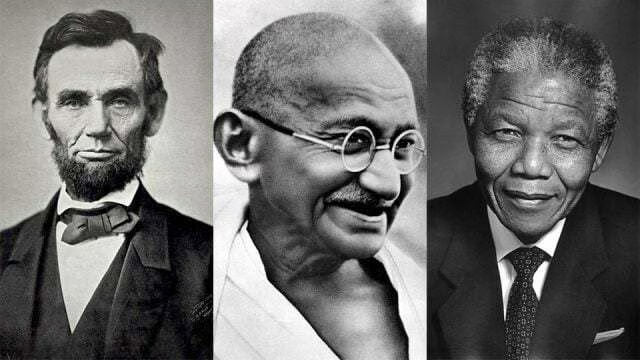Greatness vs. Imperfection: How Should We Rate Our Leaders?

Trump’s presidency has forced me to re-evaluate what it means to be a good or bad leader.
As someone who considers himself progressive, this should be easy enough on an emotional level. He’s said and done horrible things, so he must be horrible. But things become murky when you look at some of our most revered leaders in history.
Gandhi is widely considered to have been highly racist towards Africans, referring to them as Kaffirs, which is analogous to the n-word in today’s language. "Kaffirs are as a rule uncivilized—the convicts even more so. They are troublesome, very dirty, and live almost like animals."
Thomas Jefferson and George Washington owned many slaves in a time when people like Alexander Hamilton refused to. Hamilton himself was an adulterer, as was Martin Luther King, Jr., who is also widely understood to have plagiarized significant pieces of his doctoral dissertation as well as his speeches.
Upon inspection it’s far more difficult than it should be to find great people throughout history who did not have some sort of glaring moral flaw, failure, or fumble during the course of their lives. So the obvious question presents itself:
What magnitude of flaw is required to mark a great person as no longer great?
Thomas Jefferson and Martin Luther King, Jr. are strong cases in point. Martin Luther King, Jr. was a preacher who regularly cheated on his wife and stole writing from his students. Jefferson was a populist who championed agrarian simplicity and thought Hamilton’s banking system would create a nation of borrowing materialists, yet he travelled everywhere with an elaborate entourage and died buried in debt.
Have these flaws undone their greatness? At present that answer is no, so the question becomes instead, "Should they have?"
When normal folk are prodded on topics like these about people they respect, we hear noises like, "best intentions", or, "flaws in good people". And when regular people already dislike the person, we hear things like, "Well now we know the truth.", or "I always knew he was rotten."
But these subjective reviews leave us no closer to an objective benchmark, and that’s what interests me.
A universal measurement
Many want to say that it’s the intentions that matter, more than the actions, and that good people mean well but might still behave poorly because they’re flawed. Others say it’s not about what you meant to do, or what you wish you had done, but rather what you actually ended up doing.
President Bush II, for example, might have had the best intentions in Iraq, but what he did was lead to the death of hundreds of thousands of Iraqis, the loss of more than 5 trillion dollars, and thousands of American lives.
Perhaps the cleanest judgement can be made using three separate measurements, each scored from 1 to 10:
The world this person would create if they were all-powerful. 1 is the worst possible world, and 10 is the best possible world.
Their wisdom, integrity, and effectiveness in bringing that world into existence. 1 is they were complete hypocrites about their lifestyle vs. what they proclaimed, or they were completely ineffective at making it happen. 10 is that they lived according to their words, and/or were effective at bringing those changes into the world.
The overall good or evil that resulted from their actions. 1 is massive suffering of hundreds of thousands, millions, or billions of people. 10 is a massive improvement in happiness of similar numbers of people.
The minimum score is 1 (1 x 1 x 1), and the maximum score is 1000 (10 x 10 x 10).
So, as examples, George Bush II and Thomas Jefferson did well in the "ideal world" measurement, as Bush thought he was going to fix Iraq and everyone would love him, and Jefferson would have made slavery disappear overnight if it were easy and had no impact on his lifestyle. But the reality is that Jefferson kept slaves his whole life in order to maintain the luxury he desired, and Bush’s actions lead to the suffering and death of hundreds of thousands.
Let’s try a few, and see what we get.
TABLE 1. — Judging good and evil in various world leaders.
As you can see, it’s quite difficult to assign the various values, as that process operates on its own set of assumptions and biases. I definitely need some guidelines for assigning each value so we can approach some sort of consistency, but even with these complications I think the process is illuminating.
Another thought I have, looking at the outputs, is that the worldview and impact numbers should weigh heavier than the adherence.
Anyway, I think it’s an interesting exercise, if nothing else.
How would you adjust the factors and/or set the values for the leaders? Send me recommendations and I’ll include them in the list.